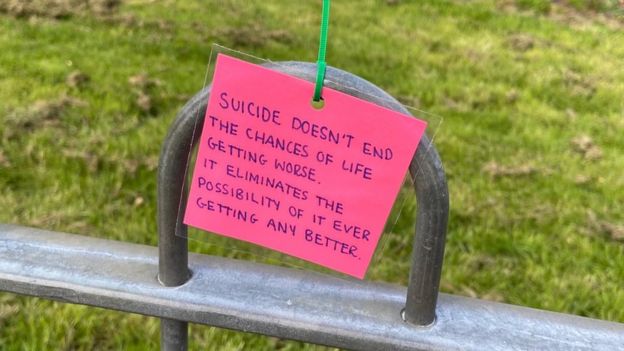James Donaldson notes: As I’m slowly getting on top of my physical health issues, I am turning more and more of my time and efforts towards mental health issues, especially pertaining to our young people and student-athletes.
Having gone through a recent bout of depression and suicidal thoughts myself, I realize now, that I can make a huge difference in the lives of so many by sharing my story, and by sharing various resources I come across as I work in this space. http://bit.ly/JamesMentalHealthArticle
A parent’s guide to helping a child in distress
Nadine Kaslow, PhD
What do you do when you’re worried that a child might be feeling suicidal? First and foremost, it’s important that you talk to him about your concerns in a calm, non-accusatory manner. Sometimes when parents are very worried, they end up saying, “Don’t think this way,” or “You shouldn’t feel that way,” and they come across not as loving and caring, as intended, but as critical. Children respond negatively to that. So you really need to be as calm and non-accusatory as you can when talking to them.
Show the love
It may seem obvious to you that you love your children, and that they know you love them. But when they’re having a hard time, kids need to hear over and over again from you how much you love them, and how much you care about them. It’s not good enough to just say, “You know I love you.” You need to convey that in small and big ways. These days, we all have so many things we’re juggling that kids can end up unsure of where they fit in, and whether you really have time for them. Let them know how important they are to you.
Express empathy
It’s also important to validate a child’s feelings. You want to make statements that express empathy for her distress: “It sounds like that was really difficult.” “I know how painful that can be.” “I know what that’s like. I’ve felt that way.” Telling them not to feel that way, to “pull it together,” isn’t as helpful as saying, “What is it that you’re concerned about, and how can I help you?” If you’re really concerned about your child it’s important that you encourage him to get professional help, and that you convey that getting help isn’t weak, but something you would respect him for doing, and that you would work together to accomplish.
Prioritize the positive
Another important way to prevent suicidal behavior is to prioritize interacting with your child in positive ways. Some times we get into a sort of vicious cycle with a child. The child does something concerning; the parent gets critical; the kid does something more concerning; the parents get more upset. All interactions turn contentious. Interacting in positive ways means doing fun things together, hanging out and chatting about things that aren’t controversial, that aren’t difficult.
Minimize conflict
So choose your battles wisely with your kid. It’s part of normal development for adolescents to rebel, and you need to pick what you’re going to set limits about, and the rest of the time you want to focus on the positive connections. It also helps to try to increase your child’s involvement in positive experiences. Kids who are involved in a lot of engaging or fun activities tend to fare better. Your goal as a parent is to reassure struggling kids that they won’t feel like this forever, and you can help do this by promoting positive experiences. When kids feel suicidal it’s often because they feel hopeless and can’t imagine things being better.
Stay in touch
It’s also really important to monitor your child’s whereabouts when they aren’t with you, whether online or out of the house. You can’t stop your kids from texting and Facebooking and using Twitter. That’s normal social interaction at this point. So you need to get on Facebook yourself, learn how to tweet, learn how to text. And use those channels to stay on top of what your kids are doing.
Know your child’s friends
In the “real” world, it’s also critical to know your child’s friends—to have a good sense of who they are and to have a connection with them. Sometimes it’s harder the older your kids get, but it’s really important you do that. You should know the parents of their friends and be in touch with them, too. And you want to communicate regularly with your child’s school to ensure her safety and care in the school setting. Don’t hesitate to use the school and the people in the school as partners in your child’s care when you have concerns.
Talk openly
But again, the crucial first step: If you think your child might be suicidal, talk with him about it, ask him about suicidal thoughts. Sometimes people are afraid that if they talk about it it will make suicidal thoughts more real, and suicide more likely to happen. But the truth is that if a child feels that he has someone safe in the family that he can talk to, he feels better. He feels more understood. He feels like there’s more empathy for him. And that gives you an opening to explain the value of psychotherapy, and possibly medication for the feelings that are causing him so much pain.
Find a clinician who’s a good match
To get a referral to a mental health professional, you can consult your child’s doctor or a psychologist at his school. I recommend that you look for a mental health professional who has experience with suicidal teenagers. Not everybody is comfortable with, or has experience with kids who are suicidal. And when you’re interviewing people, it’s important to pick somebody you—and your child—feel comfortable with. So if your son says, “I just can’t connect with him; I don’t feel comfortable with him,” you want to take that seriously. Of course, if he does that with the second person and then the third person, at some point you may need to say, “Well, of these three people, who did you feel best with?”
Participate in therapy
And once you’ve found a clinician, participate actively in therapy with your child. You need to be a partner in your child’s therapy. The more the child feels like you really care, the better. And that’s not just one parent. When somebody in the family is suicidal it’s a family affair, and everybody needs to help out and be engaged.
There are several kinds of therapy that have been shown in research trials to be particularly useful for suicidal kids. One is cognitive behavioral therapy, and that helps change kids’ thoughts, which in turn changes their feelings and their actions. And dialectical behavior therapy is another approach. It’s a more mindfulness-based approach, and we know that that’s helpful for particular types of suicidal kids, particularly those who have what’s called borderline personality disorder, and lots of suicidal thoughts. And, finally, some kids, particularly those who are seriously depressed or anxious or have ADHD, may benefit from medication in combination with psychotherapy.
Take emergency measures
Of course, if you’re worried that if you don’t do something right now your child will attempt suicide, you need to call 911, or whatever the emergency mental health access number is in your community, or take your child to the hospital. Suicidal thoughts or behaviors are an emergency, and must be considered as such.
For more information and resources on suicide see the APA’s suicide help page.



